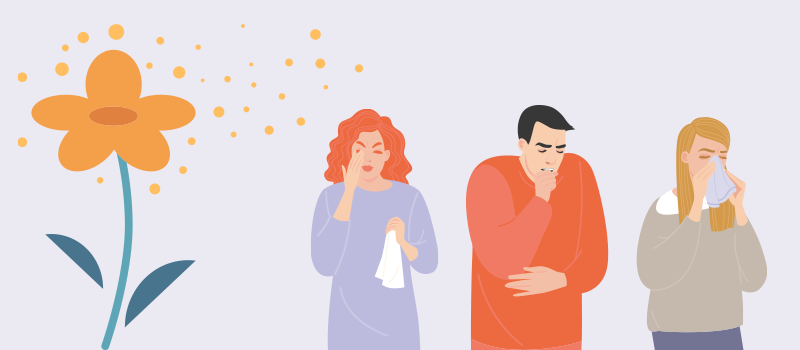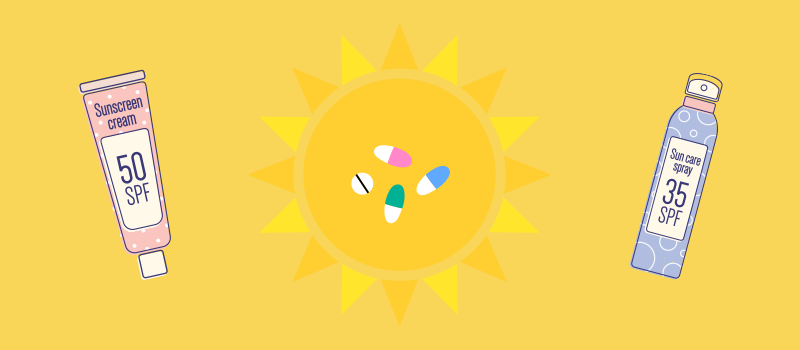What’s the Buzz
The Bee Healthy Blog
Claritin vs Zyrtec: Similarities and Differences

Claritin (loratadine) and Zyrtec (cetirizine) are commonly used to treat allergy symptoms. Both are available over the counter without a doctor’s prescription. Claritin and Zyrtec are two popular brand names among other allergy medicines available at your local pharmacy.
All of these different allergy relief products promise relief against allergy symptoms. They come in different options for package sizes and dosage forms, including oral tablets, chewable tablets to orally disintegrating tablets, and oral liquid. You may wonder which allergy medicine would be the right choice for you.
Like any other medication, allergy relief is not one-size-fits-all; this article will discuss the similarities and differences between Claritin and Zyrtec and how these two over-the-counter antihistamines work for allergy symptom relief. Please continue reading to learn about the slight differences between each medication and how those variations could help you choose a remedy that fits your needs.
How do allergy medications work?
Allergy medicines called antihistamines work by dampening the reaction of your immune system when it encounters an allergen. Allergens can be anything a person is allergic to, such as dust, mold, tree pollen, and pet hair. Once the immune system is alerted of the entry of an allergen, antibodies are produced, and the natural chemical called histamine is released. As a result, stuffy, runny nose, watery or itchy eyes occur during these attacks.
Blocking the release of histamine, Zyrtec, Claritin, and other antihistamines provides relief to these allergy symptoms. Antihistamine drugs treat symptoms of hay fever (seasonal allergies) caused by pollen, grasses, weeds, etc., as well as year-round allergies (perennial allergic rhinitis) caused by pet dander, mold, dust mites, etc. They are also used to control symptoms of allergic skin rashes.
Do you suffer from seasonal allergic rhinitis (hay fever) or year-round (perennial) allergic rhinitis? There are several effective medications for reducing allergy symptoms, such as sneezing, runny nose, itchy nose and throat, and itchy, watery eyes.
What are the similarities between Claritin and Zyrtec?
Both Claritin and Zyrtec are second-generation antihistamines which are the newer agents. A second-generation antihistamine, such as Claritin or Zyrtec, is less likely to cause adverse effects like drowsiness compared to first-generation antihistamines (older antihistamines) such as diphenhydramine (Benadryl). Therefore, when it comes to drowsiness, second-generation antihistamines have less worrisome interactions with other medicines that are sedating, such as anti-anxiety medicines or pain medicines.
Zyrtec and Claritin are both OTC (over-the-counter) and are available in low-cost generic forms.
The indications for these medications are similar. Zyrtec and Claritin are both used to treat allergies, including seasonal allergic rhinitis and other upper respiratory allergies; however, in addition to relief of allergy symptoms, certain liquid formulations of Zyrtec (cetirizine) are also indicated to treat chronic hives. They provide short-term relief from allergy symptoms such as runny nose, sneezing, itchy nose and throat, and watery or itchy eyes. Taking antihistamines can also provide relief from mosquito bites and symptoms of allergic reactions in the skin, such as urticaria (hives).
What is the main difference between Zyrtec and Claritin?
The main difference between Zyrtec and Claritin is the active ingredients. The active ingredient in Zyrtec is cetirizine hydrochloride, while the active ingredient in Claritin is loratadine.
What is the difference between loratadine and cetirizine?
Age range
Claritin is approved to treat seasonal allergies, hives, itching, and other allergic symptoms in adults. Children as young as 2 years old can use oral suspension and chewable tablets. Keep in mind that oral tablets, orally disintegrating tablets, and capsules should only be used in children 6 years and older.
Zyrtec is approved to treat the same range of allergy symptoms as Claritin in adults. Oral suspension can be used in children 2 years and older. Oral tablets can only be used in children 6 years and older.
Dosage forms and amounts to treat allergy symptoms
Claritin (loratadine) is available as oral tablets (10 mg), oral liquid (5 mg/ 5 mL), chewable tablets (5 mg, 10 mg), and orally disintegrating tablets (5 mg, 10 mg). The usual adult dose for hives and seasonal allergy symptom relief is 10 mg by mouth once daily. For hives and seasonal allergy symptom relief in children between the ages of 2 and 5, the usual dose is 5 mg by mouth once daily, and the usual dose is 10 mg by mouth once daily for children 6 years and older.
Zyrtec comes as tablets, capsules, orally disintegrating tablets, chewable tablets, and oral liquid. The usual dose of oral tablets, chewable tablets, and orally disintegrating tablets for Zyrtec is 5 mg to 10 mg daily in adults and children 6 years of age and older. For oral liquids, the usual dose for children between the age of 2 and 6 is 2.5 mL by mouth once daily, and the maximum daily dose is 5 mL. Both allergy medications, Zyrtec and Claritin, can be taken with or without food.
Onset of action and duration of allergy relief
Claritin starts working around 3 hours after taking a dose. The effects last for 24 hours.
Zyrtec is faster acting and starts working within 1 hour. Claritin also starts working within 1 hour and provides allergy relief for around 24 hours.
Contraindications
People who have had an allergic reaction to loratadine or desloratadine (Clarinex) in the past should not take this medicine. In addition to liver and kidney disease, people with a genetic condition called phenylketonuria (PKU) should inform their healthcare provider about this condition since certain chewable forms of Claritin contain phenylalanine, which is not safe for those with PKU. Claritin should be safe for use during pregnancy and breastfeeding. However, it is always best practice to let your doctor know if you are pregnant or breastfeeding before starting a new medication.
Zyrtec is contraindicated in people who have had allergic reactions to cetirizine hydrochloride or hydroxyzine (Atarax, Vistaril). It should be used with caution in people with severe liver disease, kidney disease, and those taking other drugs that can also cause drowsiness, such as sedatives, anxiety medicines, and muscle relaxants.
Side effects
Common side effects of Claritin include dry mouth, headache, drowsiness or sleepiness, and fatigue. Serious side effects and adverse reactions of Claritin can include a severe allergic reaction presenting with skin rash, hives, itching, hoarseness, difficulty breathing or swallowing, and swelling of the face, eyes, lips, tongue, and throat. Other serious reactions include problems urinating, mood changes, tremors, and fast or irregular heartbeat.
Common side effects of Zyrtec include drowsiness, dizziness, dry mouth, sore throat, fatigue, stomach pain, and headache. Serious side effects of Zyrtec may include allergic reactions, vision changes, confusion, mood or behavioral changes, and pounding or uneven heartbeat.
Precautions
Even though both Zyrtec and Claritin can cause drowsiness, Zyrtec is a lot more sedating than Claritin. Alcohol and other drugs interact with allergy medicines and can increase drowsiness. Talk to your healthcare provider before taking Zyrtec or Claritin if you are taking sedatives, sleeping pills, tranquilizers, or muscle relaxers. Be careful when driving motor vehicles, operating machinery, or doing other hazardous activities while on any medication that can cause drowsiness, dizziness, or blurred vision.
Certain chewable forms of Claritin contain phenylalanine, and it is not safe for people with a genetic condition called phenylketonuria (PKU) that causes phenylalanine to be built up in the body.
Cost
Loratadine generic may be under $8 for 90 tablets of the 10-mg dose and under $10 for 10 tablets of the Claritin brand 10-mg dose with a BuzzRx discount card.
Cetirizine generic may be under $5 for 90 tablets of the 10-mg dose and under $12 for 14 tablets of the Zyrtec brand 10-mg dose with a BuzzRx discount card.
Which has fewer side effects: Claritin or Zyrtec?
Claritin is less likely to cause sedation, make you feel drowsy and sleepy, and is preferred for treating mild to moderate allergy symptoms. However, taking Zyrtec may be more effective for severe symptoms.
Both Claritin and Zyrtec are effective allergy medications, but they vary slightly. Every person is different, and the best antihistamine allergy medicine for you will depend on the symptom relief you obtain and the side effects you experience on Claritin vs Zyrtec. Trying different medications to determine which one works best for you may be helpful. Besides Claritin and Zyrtec, other drugs can treat allergy symptoms, such as Allegra and Xyzal, which you should also consider and discuss with your healthcare professional.
References:
- https://medlineplus.gov/ency/patientinstructions/000549.htm
- https://www.accessdata.fda.gov/drugsatfda_docs/label/2002/19835s15,%2020346s8lbl.pdf
- https://www.accessdata.fda.gov/drugsatfda_docs/nda/2000/20-641S007_Loratadine_prntlbl.pdf
- https://medlineplus.gov/druginfo/meds/a697038.html
- https://dailymed.nlm.nih.gov/dailymed/drugInfo.cfm?setid=b165db38-b302-4220-8627-77cb07bb078c
- https://dailymed.nlm.nih.gov/dailymed/drugInfo.cfm?setid=ac32d6f9-f553-4d5c-ad36-575af5ea56de
- https://reference.medscape.com/drug/quzyttir-zyrtec-cetirizine-343384
- https://www.ncbi.nlm.nih.gov/books/NBK542278/#
- https://www.ncbi.nlm.nih.gov/books/NBK549776/#:












SOCIAL